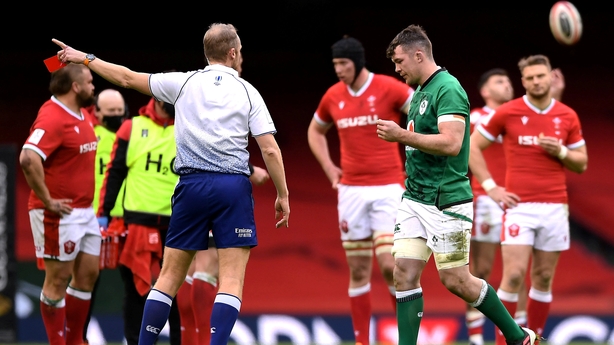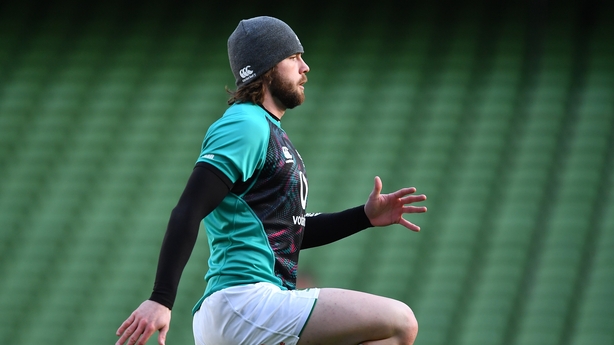We're two years into the Andy Farrell reign and for the first time in that period the Irish rugby team are dealing with genuine expectation.
His first campaign came with the hangover of the 2019 World Cup, the mood around Irish rugby still wounded from the failings in Japan, and by the time the tournament was postponed in mid-March Ireland were still going through the motions; reasonable wins at home to Wales and Scotland followed up by a reality check at Twickenham.
When rugby resumed that autumn, Ireland looked sluggish.
It was bookended by impressive performances against Italy and Scotland at the Aviva, but overall the atmosphere was one of concern at another defeat to England in which Ireland failed to land any real punches.
That cloud hung over them for much of last year's Guinness Six Nations before it finally clicked in Round 5, the 32-18 win against England giving us a glimpse of what was to come.
Heading into the Autumn Nations Series in November, we were dealing with quiet confidence rather than true belief, but the wins against New Zealand, Japan and Argentina, and specifically the manner in which they were achieved, means Ireland have moved up a gear from hope into expectation.
So what is that expectation?
With an eight-game winning streak and a relatively healthy squad, the simple answer would be that Ireland have to be aiming for a title.
But since we're in an even year, the away trips to Paris and Twickenham mean a title would be hard-earned, and reliant on other results barring an unlikely Grand Slam.
Being realistic rather than simplistic, three home wins and an away victory either in Paris or London would represent progress, another step along the road, and would crucially give scope for improvement heading into a World Cup year.
If that's enough to win a title, even better.
'We'd all love a trophy," Farrell said on Thursday when asked if silverware would be a major step for his side.
"Nobody would lie to that but at the same time, for us, success is pushing on with our game. It definitely is and I think trophies look after themselves in that regard."

The fixtures list in an even year always look tougher on paper for Ireland - home games against Italy, Wales and Scotland, with away trips to England and France - but their recent showings have been mixed.
There was the Grand Slam in 2018, a perfect campaign that arguably hasn't aged well given how their form plummeted the following season.
In 2014 they won the title, and while beaten at Twickenham they did win a shootout on the final day in Paris under real pressure.
The inclusion of Mack Hansen on the wing and to a lesser extent James Hume on the bench would indicate that Farrell's team is not necessarily a closed shop though.
On the flip side there was 2016 and 2020, with two away defeats in each, and a home draw against Wales in 2016, and both campaigns played in the immediate aftermath of emotionally draining World Cup campaigns.
Two away defeats would leave a sour taste, and a sign that Ireland still have a long way to improve, while a two-win tournament would raise some alarms.
However the competition plays out, Ireland can't hide behind the excuse of injuries and Covid, at least for now.
Unlike England, France and in particular today's opponents Wales, Farrell has been able to prepare for this year's championship with largely the same squad and starting XV that would have been first choice in November.
Fourteen of today's starting line-up began the November win against Japan, while Mack Hansen and Tadgh Beirne are the only changes from the victory against the All Blacks a week later.
That continuity in team selection has been crucial over the last few games, with changes being minimal, particularly in the pack.
Had it not been for an injury to Jack Conan on the eve of the win against Argentina, we would be seeing a fourth straight game of Conan, Doris and Van Der Flier in the back row, with Peter O'Mahony being the experienced reliever off the bench.
That was a luxury Farrell couldn't afford in his first 18 months in charge, with the back row regularly being chopped and changed due to injuries in the 2020 and 2021 campaigns.
The inclusion of Hansen (below) on the wing and to a lesser extent James Hume on the bench would indicate that Farrell's team is not necessarily a closed shop though.

As impressive as Hansen has been for Connacht this season, it still came as a surprise to see him leapfrog both Rob Baloucoune and Jordan Larmour for a starting wing spot following the injuries to both James Lowe and Keith Earls.
"He's a smart rugby player, he makes things happen, he knows how to get himself involved in the game," Farrell said of the debutant this week.
"He’s got great feel, he’s got a good skillset across the board."
He's also probably the closest in style to the man he's replacing in the 11 shirt, Lowe, who had an unconventional role in the team during the Autumn Nations Series, drifting in off his wing and becoming more and more involved infield.
Hume's inclusion on the bench should be a sign of encouragement for those on the fringe of the squad.
The Ulster centre spoke honestly and openly about his frustrations at not being picked in November, and his form since then has been inspired, with Farrell adding he's been "very impressed" with the 23-year-old.
"He has certainly buckled down and gone away from the Autumn Series and put his best foot forward to get back into the room for the Six Nations.
"He is the type of guy involved in the autumn so things are a little fresher for him coming back in so his knowledge about getting back up to speed, for someone who is very young with limited international experience, has helped him massively in the first ten days of training."
Hume's inclusion in the matchday 23 comes with the asterisk of Robbie Henshaw carrying an injury this week. The Leinster centre missed training at the end of last week with a minor niggle, but he was back training fully in the days leading up to the game as confirmed by Farrell on Thursday, and in other seasons may have been risked for a Six Nations opener, which is a sign of the depth Ireland have built in midfield.
In a rarity, Ireland begin their 2022 Six Nations with the same three fixtures as they had in 2021; Wales, France and Italy.
And to further add to the sense of déjà vu, the build-up to this afternoon's game against Wales has followed similar patterns to that of 12 months ago, with Wales in the depths of an injury crisis.
And while Wayne Pivac's side surprised Ireland in the opener in Cardiff last season, their list of absentees in 2022 significantly overshadows the 2021 version, with Alun-Wyn Jones, Ken Owens, Josh Navidi, Taulupe Faletau, Justin Tipuric, Leigh Halfpenny and George North all unavailable to the defending champions.
It's left then with a squad that's strong in some areas, but littered with potential weaknesses.
👀 More history beckoning for Ireland?
— RTÉ Rugby (@RTErugby) February 4, 2022
We're about to find out because it's that time of year again as the #SixNations begins and Wales come to Dublin 🏉
📺📻 Watch #IREvWAL live on @RTE2 & @RTEplayer from 1pm tomorrow and listen in on @SatSportRTE #rterugby #6Nations pic.twitter.com/FXNG1e1zXh
Four of their starting backline are British and Irish Lions, with Liam Williams, Josh Adams, Louis Rees-Zammit and captain Dan Biggar all world class on their day.
The back three of Williams, Rees-Zammit and Johnny McNicholl looks like being the area where Wales can potentially trouble Ireland, who New Zealand were ruthless at exposing in November when they managed to get the ball to the edge of the Irish defence.
But the challenge for Wales will be getting the ball to that edge, because on paper at least Ireland look to have the better of the forward packs, with Ireland's powerful and mobile tight five being one of their points of difference in November.
Wyn Jones and Adam Beard were in Lions form last season while Tomas Francis is an experienced face at tighthead, but overall their front and second row seem to lack the same level of ball carriers to dominate Ireland.
There will always be a reluctance to write off Wales, particularly after they made fools out of every pundit 12 months ago, but given the continuity in selection Ireland have been afforded, it's hard to see any complacency from Farrell's side, who have no excuse not to perform.
Verdict: Ireland
Ireland: Hugo Keenan; Andrew Conway, Garry Ringrose, Bundee Aki, Mack Hansen; Johnny Sexton (capt), Jamison Gibson Park; Andrew Porter, Ronan Kelleher, Tadhg Furlong; Tadhg Beirne, James Ryan; Caelan Doris, Josh van der Flier, Jack Conan.
Replacements: Dan Sheehan, Cian Healy, Finlay Bealham, Ryan Baird, Peter O'Mahony, Conor Murray, Joey Carbery, James Hume.
Wales: Liam Williams; Johnny McNicholl, Josh Adams, Nick Tompkins, Louis Rees-Zammit; Dan Biggar (capt), Tomos Williams; Wyn Jones, Ryan Elias, Tomas Francis; Will Rowlands, Adam Beard; Ellis Jenkins, Taine Basham, Aaron Wainwright.
Replacements: Dewi Lake, Gareth Thomas, Dillon Lewis, Seb Davies, Ross Moriarty, Gareth Davies, Callum Sheedy, Owen Watkin.
Listen to the RTÉ Rugby podcast on Apple Podcasts, Soundcloud, Spotify or wherever you get your podcasts.
Follow all of Ireland's Six Nations games via our live blogs on rte.ie/sport and on the RTÉ News App or listen to live radio coverage on RTÉ Radio 1. Watch live TV coverage of Ireland v Wales (5 February, 2.15pm) and England v Ireland (12 March, 4.45pm) on RTÉ2 and the RTÉ Player.







